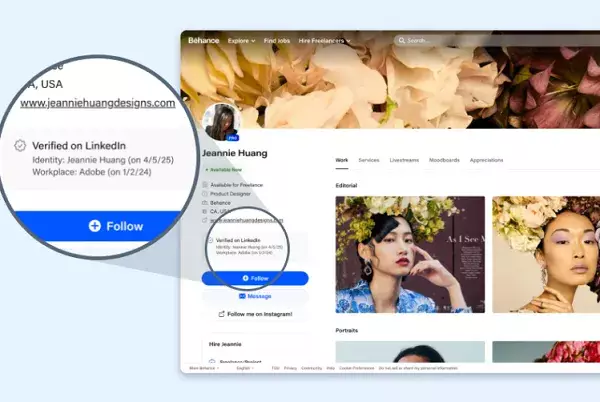In an era where online interactions often blend seamlessly with daily life, the importance of authenticity in professional networking cannot be overstated. LinkedIn, a behemoth in the realm of job hunting and professional collaboration, is stepping up to the plate with an innovative solution that seeks to heighten trust among its users. By announcing its decision to allow third-party platforms to showcase LinkedIn’s ID verification markers, the platform not only broadens its reach but also establishes a new standard for professional credibility in the digital workspace.
This move, which builds upon the ID confirmation process launched in 2023, promises to alert businesses and individuals alike that their networking attempts are backed by verified identities rather than facades or fakes. As LinkedIn integrates with diverse third-party providers, users can flaunt a “Verified on LinkedIn” badge on various platforms, including Adobe. This initiative exemplifies how companies can forge solid reputations while simultaneously reducing the burden of having to create and maintain their own verification procedures.
Building Trust Amidst Digital Uncertainty
The LinkedIn verification process distinguishes itself by facilitating a more trustworthy environment, free from celebrity-like verification biases that plague other social platforms. Anyone can earn the verification badge, which fundamentally democratizes the validation of identity and ensures that individual users—who may be ordinary job seekers or small business owners—are acknowledged just like high-profile personalities.
With over 80 million members having willingly participated in the ID confirmation process, LinkedIn is positioning itself as a pioneer in assuring that professional interactions represent real individuals, bolstering the integrity of online business practices. This step is essential in combating challenges such as spam and impersonation, which long hinder user experience and ruin the foundational notions of trust and professionalism required for effective networking.
A Dual-edged Sword: Anonymity vs. Accountability
However, amid the diligent push towards transparency and verification lies an innate conflict: the balance between accountability and anonymity. The option of anonymity in social media has persisted as a double-edged sword; while it allows for freedom of expression, it can also lead to irresponsible behavior and misleading representations. LinkedIn’s comprehensive verification system proposes a viable alternative to user anonymity while simultaneously advocating for more responsible online interactions.
Some may argue that universal ID verification can potentially pave the way for enhanced user accountability across all social platforms. Imagine a digital landscape where each voice—regardless of its volume—bears a level of ownership and responsibility. Although the intricacies of privacy raise valid concerns, LinkedIn’s strategy arguably fosters a more respectful dialogue within the professional realm, encouraging users to think critically about their online presence.
The Future of Digital Ownership and Identity
LinkedIn’s alliance with Adobe, especially its Content Authenticity app, signifies a transformative shift in how we view digital ownership. By embedding metadata that clearly identifies the creator of content, professionals in creative industries can confidently engage in sharing their work within and outside of LinkedIn’s ecosystem. This dual-layered approach not only offers verification but also protects intellectual property—an increasingly critical issue as AI-generated content proliferates.
In a world saturated with manipulated visuals and altered identities, clarity becomes an invaluable asset. As LinkedIn continues to advance its ID verification features alongside digital ownership, it champions a model that doesn’t merely seek to verify identities but also aims to enhance their value. For ordinary users to share their skills and creations authentically turns the tide in a consumer culture prone to deception.
Paving the Way for Social Media Evolution
While some may view LinkedIn’s strategies solely as an immediate business tactic, a broader implication becomes evident: regulators and policy makers ought to take note. Any successful effort to centralize user verification signifies to regulatory bodies a pathway towards developing more stringent, yet reasonable, laws regarding identity on social platforms. As society gradually confronts those nuisances linked to anonymity, LinkedIn’s initiatives might very well herald a new age where reliable digital identities become non-negotiable, fostering responsible behavior across communities online.
Indeed, LinkedIn’s commitment to verifying professional identities could set the tone for upcoming developments in how we navigate relationships in the ever-evolving digital landscape. As this story unfolds, one can’t help but wonder how these innovations will reshape not just LinkedIn, but the entire ecosystem of social networking.


Leave a Reply